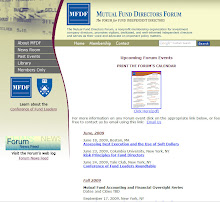Principle 1: The objectives of managing systemic risk and protecting investors should both be maintained and pursued in a balanced manner.
Walter stressed that the SEC's mission should not be narrowed to an extent that it would not be able to "obtain comprehensive knowledge of the markets and oversee the risk management practices of those firms dealing with the investing public."
Principle 2: The current regulatory framework should be restructured to eliminate gaps and overlaps and to increase market transparency, so that important products and market actors are not beyond the oversight of regulators.
Walter stated that "the most important step in any reform plan should be to remedy regulatory gaps." She further recognized that "reliance on interagency cooperation can never be a substitute for comprehensive jurisdiction," and called for central clearing, full SEC oversight of OTC financial derivatives that are significant in the debt and cash equity securities markets, and authority for the Commission to require hedge fund managers to register as investment advisers. More controversially, Commissioner Walter called for the merger of the SEC and CFTC.
Principle 3: Consumers should receive the same level of protection when they purchase comparable products and services, regardless of the financial professional involved.
Commissioner Walter recommended that investment advisers and broker-dealers be brought under the same regulatory regime, and that "every financial intermediary that offers a comparable product or service be regulated in a substantially similar way, regardless of its primary regulator.
Principle 4: Important gatekeepers should be regulated to minimize conflicts of interests, increase transparency, and foster competition.
Walter also called for for a reinvigorated regulation of "reputational intermediaries" upon whom investors rely, such as credit rating agencies, auditors, and securities analysts, to ensure these intermediaries integrity and independence.
Principle 5: No matter what new shape is constructed for financial regulation, it must incorporate strong enforcement powers for regulators to pursue wrongdoing and deter future misconduct, but those powers must be in addition to—not in lieu of—regulatory authority.
Enforcement should be a reinvigorated priority of the Commission, but should be balanced against the agency's other mission to protect investors and maintain fair and orderly markets. Rulemaking and other non-enforcement activities "are critical to establishing high standards of conduct designed to prevent fraud and other wrongdoing," and may help avoid the necessity for enforcement.
The full text of Commissioner Walter's March 2, 2009 address is available at: http://www.sec.gov/news/speech/2009/spch030209ebw.htm





